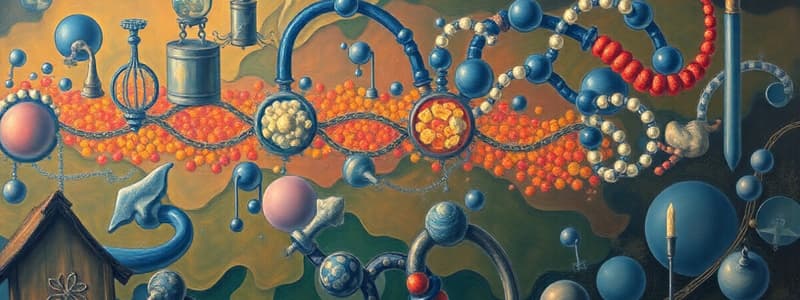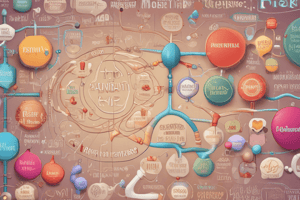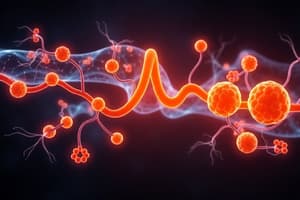Podcast
Questions and Answers
What is the primary function of anabolic pathways in metabolism?
What is the primary function of anabolic pathways in metabolism?
- To break down complex molecules into simpler ones
- To synthesize complex molecules from simpler ones (correct)
- To link carbohydrate and lipid metabolism
- To release stored energy in the body
Which of the following enzymes is NOT involved in the digestion of carbohydrates?
Which of the following enzymes is NOT involved in the digestion of carbohydrates?
- Pepsin (correct)
- Salivary amylase
- Pancreatic amylase
- Maltase
What is the energy yield from the complete oxidation of 1 gram of carbohydrates?
What is the energy yield from the complete oxidation of 1 gram of carbohydrates?
- 4 kcal (correct)
- 6 kcal
- 8 kcal
- 2 kcal
Lactose intolerance is primarily caused by a deficiency in which enzyme?
Lactose intolerance is primarily caused by a deficiency in which enzyme?
Which metabolic pathway serves as a link between anabolic and catabolic pathways?
Which metabolic pathway serves as a link between anabolic and catabolic pathways?
What is the primary consequence of the absence of intestinal lactase?
What is the primary consequence of the absence of intestinal lactase?
Which of the following is NOT a catabolic pathway of carbohydrate metabolism?
Which of the following is NOT a catabolic pathway of carbohydrate metabolism?
What is the net ATP production from anaerobic glycolysis?
What is the net ATP production from anaerobic glycolysis?
Which stage of glycolysis is characterized as an energy-requiring step?
Which stage of glycolysis is characterized as an energy-requiring step?
What important role does 2,3-biphosphoglycerate play in glycolysis?
What important role does 2,3-biphosphoglycerate play in glycolysis?
Flashcards
Metabolism
Metabolism
The chemical reactions in the body that involve the synthesis and breakdown of various substances
Anabolic Pathway
Anabolic Pathway
Builds complex molecules from simpler ones; requires energy.
Catabolic Pathway
Catabolic Pathway
Breaks down complex molecules into simpler ones; releases energy.
Amphibolic Pathway
Amphibolic Pathway
Signup and view all the flashcards
Carbohydrate Metabolism
Carbohydrate Metabolism
Signup and view all the flashcards
CHO Digestion
CHO Digestion
Signup and view all the flashcards
Salivary Amylase
Salivary Amylase
Signup and view all the flashcards
Pancreatic Amylase
Pancreatic Amylase
Signup and view all the flashcards
Intestinal Disaccharidases
Intestinal Disaccharidases
Signup and view all the flashcards
Lactose Intolerance
Lactose Intolerance
Signup and view all the flashcards
Lactose Intolerance
Lactose Intolerance
Signup and view all the flashcards
Lactose Digestion Failure
Lactose Digestion Failure
Signup and view all the flashcards
Glycolysis
Glycolysis
Signup and view all the flashcards
Glycolysis Location
Glycolysis Location
Signup and view all the flashcards
Glycolysis Stages
Glycolysis Stages
Signup and view all the flashcards
Anaerobic Glycolysis ATP
Anaerobic Glycolysis ATP
Signup and view all the flashcards
Aerobic Glycolysis ATP
Aerobic Glycolysis ATP
Signup and view all the flashcards
Glycolysis Importance
Glycolysis Importance
Signup and view all the flashcards
Study Notes
CHO Metabolism
- CHO metabolism involves the fate of food molecules after digestion and absorption.
- It encompasses chemical enzymatic reactions inside the body, focusing on synthesis and breakdown of substances.
Metabolic Pathways
- Anabolic pathways: Synthesize complex molecules from simpler ones, requiring energy (e.g., protein synthesis).
- Catabolic pathways: Break down complex molecules into simpler ones, releasing energy (e.g., oxidative processes).
- Amphibolic pathways: Act as links between anabolic and catabolic pathways (e.g., citric acid cycle).
Carbohydrate Metabolism
- CHO contributes 50% of daily caloric intake.
- Complete oxidation of 1 gram of CHO yields 4 kcal.
- Sources of CHO in food:
- Starch (50%, e.g., potatoes)
- Sucrose and lactose
- Fructose and glucose (fruits, honey)
Digestion of CHO
- Polysaccharides and disaccharides must be broken down into monosaccharides for absorption.
- Enzymes involved:
- Salivary amylase: Converts starch and glycogen into dextrins.
- Pancreatic amylase: Converts dextrins into maltose.
- Intestinal disaccharidases:
- Maltase: Converts maltose into glucose.
- Sucrase: Converts sucrose into glucose and fructose.
- Lactase: Converts lactose into glucose and galactose.
Lactose Intolerance
- Definition: A condition stemming from lactase deficiency, potentially congenital or acquired.
- Cause: Insufficient lactase enzyme.
- Effects: Undigested lactose accumulates in the intestine.
- Symptoms: Abdominal distension, cramps, diarrhea.
- Treatment: Lactose-free milk or formula.
Metabolic Pathways of Carbohydrates
- Catabolic pathways:
- Glycolysis
- Hexose monophosphate shunt
- Uronic acid pathway
- Glycogenolysis
- Anabolic pathways:
- Gluconeogenesis
- Glycogenesis
- Amphibolic pathway:
- Citric acid cycle
Glycolysis
- Definition: Oxidation of glucose to pyruvate (in presence of oxygen) or lactate (in absence of oxygen).
- Site: Cytoplasm of all cells, crucial for tissues lacking mitochondria (e.g., red blood cells).
- Steps:
- Stage 1 (energy requiring): Glucose conversion to glyceraldehyde-3-phosphate (requires energy).
- Stage 2 (energy producing): Glyceraldehyde-3-phosphate conversion to pyruvate or lactate (releases energy).
- Importance:
- Energy production (2 ATP anaerobically, 6-8 ATP aerobically)
- Main pathway for fructose and galactose metabolism
- Tissue oxygenation (by formation of 2,3-biphosphoglycerate)
- Production of intermediates for other metabolic processes (e.g., glycerol-3-P for lipogenesis, pyruvate for amino acid synthesis)
Glycolysis in Red Blood Cells
- Mature red blood cells lack mitochondria, entirely dependent on glycolysis for energy.
- Lactate is the end product.
- Net energy production: 2 ATP.
- Glucose uptake is independent of insulin.
- Production of 2,3-biphosphoglycerate occurs.
Regulation of Glycolysis
- Key enzymes: Hexokinase/glucokinase, Phosphofructokinase-1 (PFK-1), Pyruvate kinase.
- Hormonal regulation: Insulin stimulates synthesis; glucagon inhibits synthesis.
- Allosteric regulation:
- G-6-P inhibits hexokinase (not glucokinase).
- Fructose 2,6 biphosphate stimulates PFK-1.
- Citrate inhibits PFK-1.
- Fructose 1,6 biphosphate stimulates pyruvate kinase.
- Covalent modification: Pyruvate kinase inactivation by phosphorylation.
- Energy regulation: ATP and AMP affect PFK-1 and pyruvate kinase activity.
In Vitro Inhibition of Glycolysis
- Arsenate: Competes with inorganic phosphate in glycolysis.
- Iodoacetate: Inhibits glyceraldehyde-3-phosphate dehydrogenase.
- Fluoride: Inhibits enolase, used in clinical labs.
Important Note
- Deficiencies in glycolytic enzymes, particularly pyruvate kinase, can lead to hemolytic anemia.
Studying That Suits You
Use AI to generate personalized quizzes and flashcards to suit your learning preferences.





